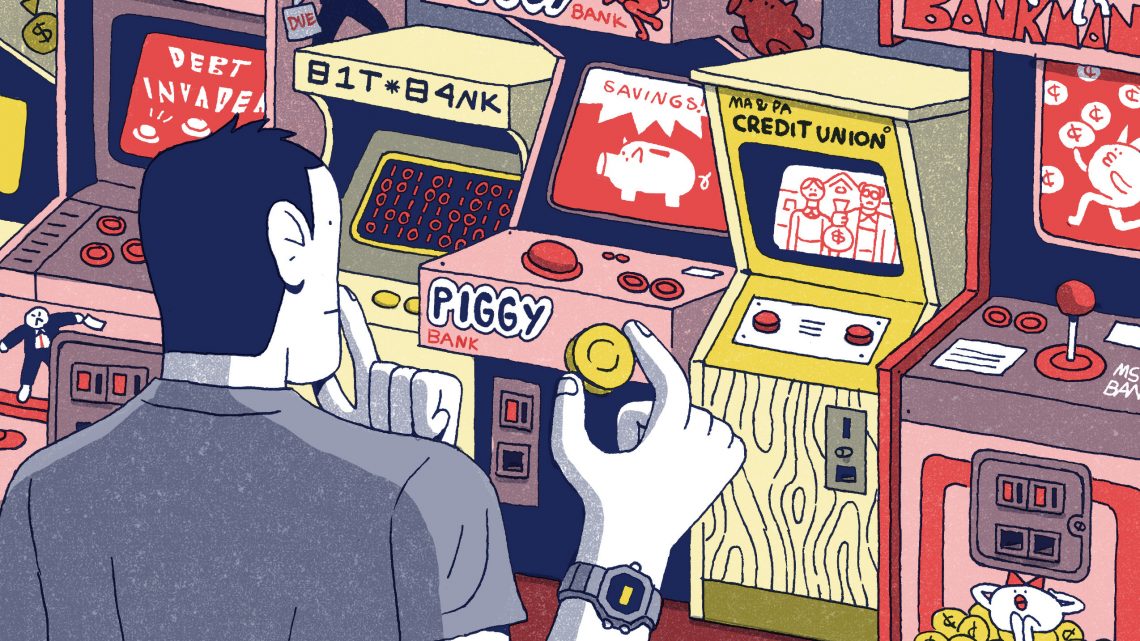
The Big Bank You’re Using Is Probably Ripping You Off
June 15, 2018After a rough couple of years, Wells Fargo devised a simple strategy to make people forget it stole from unwitting customers: double-down on cheesy Americana. Back in May, the bank launched a TV spot, part of a campaign called "Re-Established," that conveyed a two-fold message. One was a history lesson about how the bank carried gold back East from California in the 1800s, complete with images of rugged cowboys. The other was an announcement that they'd pulled back from product sales goals and thereby alleviated perverse incentives to sign customers up for new accounts without their consent.
As a longtime Wells Fargo customer and presumably at least part of the audience they had in mind, I thought the spot backfired. I'd honestly forgotten why I was supposed to be mad at the place I'd been banking ever since someone basically forced me to sign up at gunpoint during my college orientation. And it's unlikely that I would have remembered their specific misdeeds had they not reminded me of them by way of a cool Western montage soundtracked by The Black Keys. But here I was, newly incensed and willing to at least try and envision what a life without Big Banks might look like.
To that end, I recently called up Kim Palmer, a banking expert at NerdWallet. She quickly confessed to using Wells Fargo for her own checking, while acknowledging that her account yields suboptimal outcomes, specifically when it comes to interest. While I always suspected I was being screwed over, I was actually surprised to learn how bad it was: The average interest earned per year in a typical checking account has hovered around 0.04 percent, and in a message, a Wells Fargo customer service rep told me that Palmer and I were making 0.01 percent, which was downright laughable.
The reality is that big banks can offer near-zero returns to customers because they know they're too lazy or busy or afraid to switch shops. The fact that Palmer was willing to put up with it despite literally having the job title of "banking expert" just goes to show how much inertia is at work here.
"It's hard to change your bank," she explained. "You have a lot of things tied to it, and that's the hurdle for a lot of people. It's a big process since you have so many automatic deductions from it."
That said, Palmer outlined three good options for not dealing with Wells Fargo—or another bank like it: community banks, credit unions, and online alternatives. Naturally, I decided to look into all of them.
Community Banks
There's a bank in my neighborhood called Dime that I have always been afraid of, and not just because I once had to avoid the employees outside aggressively offering free gifts to people who sign up. More than that, my trepidation sprang from never having seen a single branch outside my Brooklyn enclave, and not knowing anyone else who used them. But then again, since the whole point of this exercise was to distance myself from banks I'd heard of (either because they helped cause the financial crisis or scammed customers or both), I tried to keep an open mind.
It quickly became clear that my fears of the bank going out of business and stealing my money were unfounded. As Palmer explained, while banks can and do shutter, that's not a problem if they're federally insured by the FDIC. (This is usually required by state or local law.) In the unlikely event disaster were to strike, a customer could just file an insurance claim and, assuming the government remained a thing—which, well, OK—they'd be made whole sooner or later. But more than that, Palmer praised the virtues of the local banks as an institution, noting she loved them when she was a grad student in Chicago. "It gives you a sense of belonging to a community," she told me. "They often support local charities and run local events."
"The downside is that they can lack some convenience," Palmer continued. "If you're traveling, you might not be able to find at ATM you need. Whenever I came home to DC, I had to get cash out ahead of time."
This honestly didn't sound like the biggest deal to me. There are no Wells Fargo locations anywhere near me in Brooklyn, which meant I was already dealing with that sort of inconvenience all of the time—not just when traveling. But when I took a look at Dime's interest rates, I wasn't convinced it was the best decision to take my money there. For the balance I was likely to carry in the account, I would be getting somewhere between 0.08 and 0.1 percent interest. While that was certainly way better than what Wells Fargo was offering, I figured that if I had already decided to put in effort, it made sense to find an option that wasn't just free of the ilk of Wall Street, but that actually helped me carve out the best financial future possible.
Old-School Credit Unions
I always quietly suspected credit unions were the same thing as lending circles, but that is not the case. In reality, they're like the co-ops of money, as Stacy Mitchell, the co-director of the Institute for Local Self-Reliance, a think tank focused on community-based economics, explained to me.
Because they don't make a profit, credit unions can offer better interest rates for deposits and lower interest rates on loans on average, and can also pay out any surplus to members as a dividend. Mitchell noted she occasionally sees a little bit extra deposited in her savings account, and that she gets to vote on any decision her credit union makes because membership gives her the status of part-owner.
Dividends sounded great, but one thing I finally just got into—three years after first writing about it for this column—is credit-card reward points. I'd be a bit reluctant to give them up entirely after doing all that work to raise my credit score, but Mitchell described how to straddle the line between taking advantage of the big banks while supporting the smaller ones. For instance, she uses an American Airlines or American Express rewards card while shopping at Whole Foods or other big chains, and then her community-bank credit card when making purchases at her local bookstore or neighborhood coffee shop.
This matters because big banks set the swipe fees, and use the money they collect from them to offset the costs of paying out rewards points and airline miles, Mitchell explained. A local credit union or community bank typically offers a basic card without those extra rewards, and therefore charges merchants lower fees to swipe their cards. "I'm not letting Visa get rich at the expense of my local bookstore," she told me.
I was pretty much sold at this point, and headed to an online search tool that helps people find credit unions in their community. The list I got back was disappointing: Everything in my area was named something like Epiphany FCU, or else was clearly meant for the Polish population of the neighborhood to the north of mine. I had to ask Mitchell: Would any of these places even take me as a member?
Basically, she explained, credit unions began as a way for underserved populations to get financial services they might otherwise be denied by big banks. The first ones served German urbanites in the mid 1800s before spreading all over Europe, where they caught on among rural populations who lived far from traditional financial institutions. They spread to America in wake of the Depression, and became popular among immigrants who might typically be denied personal loans out of a combination of racism and poverty. Today, credit unions have a defined membership based on a common association—like a shared religion, ethnic background, school, or profession.
"A big bank is gonna look at you on paper and see if your financial metrics qualify you for a loan," Mitchell said. "In the case of a credit union among co-workers, they know you, and you have some accountability to them because of your personal relationship. They can take into account that you make good on your promise and show up to work, for instance, on top of just your credit score."
That all sounded nice, but what did it mean for me, someone whose employer has no credit union and doesn't readily identify with a religious or ethnic group in my area?
Palmer and Mitchell had helped convince me it was possible—and worthwhile—to ditch my bank, but I was still skeptical there was a nearby brick-and-mortar place that would work for me. So like any other millennial hungry for new ways to solve age-old problems, I decided to do a little research into whether I could get all the moral (and personal) benefits of a credit union or community bank online.
Online Alternatives
With a quick Google search, I quickly stumbled upon Alliant Credit Union, which seemed too good to be true. The place offered 0.65 percent annual interest for its checking accounts, along with a whopping 1.5 percent on savings accounts. (Another, similar option with its own perks is called Connexus, and Nerdwallet put out a nice list of other options here.) When it comes to savings, I've been using an app called Digit for years, which doesn't offer interest because it's not technically a bank, but does pay back 1 percent annual bonuses every three months. I kind of want to keep that, because while I'm not getting as much money as I could be, I like the fact that Digit uses an algorithm to save automatically for me based on my spending habits. That feature still seems worth more than the few bucks they charge me every month, along with whatever I'm forgoing in regular interest.
But when it came to my checking account, I was now certain, there was absolutely no reason I should still be using Wells Fargo. There are a handful of online credit unions that will let you join for a charitable donation, and Alliant is one of them. So I made a one-time $10 donation to a charity for foster kids, signed up for the account, then switched over my direct deposit from work. That ten bucks would easily be made up for by the fact that I'll be paying fewer ATM fees, I suspected. Like I said, there are no Wells Fargos anywhere near where I live, but Alliant has a pretty robust network of random street ATMs where they don't charge fees and also will reimburse up to $20 in fees from non-network ATMs per month.
This was starting to have had the makings of a very solid deal. Still, it was only natural to wonder what I might be missing out on before I put pen to paper, or whatever we're calling the online equivalent of that now. Mitchell, the brick-and-mortar credit union evangelist, told me that one benefit of using her preferred mode of banking was that if she had a question, she could dial a local number and have a person down the street pick up the phone. That sounded really nice— even quaint—but the truth is that I don't think I've ever had a question about my bank account besides what they're doing to make my money into more money. Alliant seemed pretty harsh with their policy on overdraft fees, but having literally zero dollars is, fortunately, not a problem for me at this juncture of my life.
It can seem impossible to take advantage of any technology in modern life without harming someone, whether it's the cab driver you're screwing over when you drunkenly summon an Uber, or the mom and pop store you're helping shutter when you order off of Amazon Prime. But banking may be one of the few areas in which switching to a start-up can actually do some kind of good by diverting money from bad actors into the hands of at least marginally better ones.
Mitchell told me that, as someone who does research on the economy for a living, more times than not a problem she's looking into can be tied back to Wall Street funneling wealth into the hands of the very few. "One of the most important things you can do in the world is to take your financial wherewithal and put it towards a more equitable economic system," she said. "Switching from the big banks is at the top of that list."
And as it turns out, the switch from a big bank can be more than a quixotic statement about your values or making the world a better place—it can help you secure a stronger financial footing, too. So why wouldn't you?
Sign up for our newsletter to get the best of VICE delivered to your inbox daily.
Follow Allie Conti on Twitter.


